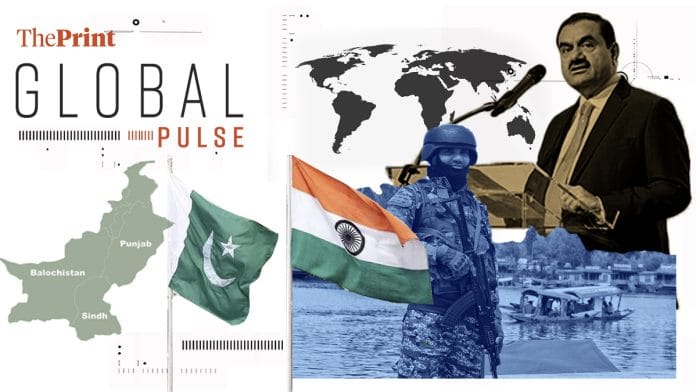New Delhi: When it comes to a potential war with India, the Pakistan government might talk tough. But tension has gripped a weary citizenry in the nation that is existentially aware that they cannot afford to go to war.
“On university campuses and in living rooms, conversations are less about battles and borders and more about inflation, unemployment, a political system that feels unrepresentative and a future clouded by uncertainty,” reports The New York Times.
Leaving the country has emerged as the lone kernel of hope for many Pakistanis.
As the Pahalgam terror attack continues to dominate headlines, the BBC poses a reminder—this is far from the first time India and Pakistan have locked horns.
“We’re once again in a conflict situation, and the story is unfolding in much the same way,” former Indian High Commissioner to Pakistan Ajay Bisaria tells the BBC.
If there are parallels to be made with past attacks, Pahalgam has “elements of Pulwama” but “more of Mumbai” (referring to the 26/11 attack in 2008).
Almost two weeks have passed since 26 unsuspecting tourists were shot dead by Pakistan-linked terrorists in India’s “mini-Switzerland” in Pahalgam, Jammu & Kashmir. India has retaliated––be it through the withdrawal of the Indus Waters Treaty with Pakistan or the slicing of diplomatic missions. However, there has been no military response.
At the United Nations, however, India is “quietly lobbying”, seeking, at the very least, neutrality from permanent and non-permanent members if it is to launch an attack, reports Anisha Dutta in Foreign Policy.
“Behind closed doors, Indian External Affairs Minister S. Jaishankar has spoken with his counterparts in Algeria, Greece, Guyana, Panama, Sierra Leone, Slovenia, and Somalia—including several currently serving on the Security Council. These calls were preceded by a significant diplomatic outreach in which India briefed dozens of foreign diplomats in New Delhi about Pakistan’s alleged complicity in the recent attack,” states the report.
In a much needed break from the perils and pitfalls of war, The Wall Street Journal brings a review of British historian William Dalrymple’s book The Golden Road, which places India at the centre of the world––the historian’s version of “vishwaguru”.
“Mr Dalrymple sets out to correct what he believes is a narrative wrong—the playing down of India and Indians in Western accounts of history,” reads the review by Tunku Varadarajan, which also contains interesting tidbits from the book.
On account of Romans searching for Indian exports like pepper, spices, ivory and the works, the museums of India “probably contain more Roman coins than those of any other country outside the boundaries of the Roman empire”.
The Guardian notes that India’s press freedom ranking is now 151––marking it among the worst countries for the same. It takes a look at India’s media landscape by speaking to a number of journalists, and spotlights how this came to be.
“At least 15 journalists have been charged under the anti-terrorism law, the 1967 Unlawful Activities (Prevention) Act, since (Prime Minister Narendra) Modi came to power, according to the International Journalists’ Network (IJN). Thirty-six journalists have been detained,” notes the British newspaper.
“India’s laws, says the IJN, have been ‘weaponised’ to silence and intimidate journalists, with the 1967 security law amended in 2019 to allow the authorities to declare an individual a ‘terrorist’ before any crime is proved in court,” it adds.
Bloomberg reports that billionaire businessman Gautam Adani has “enlisted a roster of high-powered lawyers and lobbyists” to engage with the administration of US President Donald Trump in an attempt to “sway US authorities” following his indictment on bribery charges during Joe Biden’s stint as president.
“Adani’s representatives are trying to make the case that his prosecution doesn’t align with President Donald Trump’s priorities and should be reconsidered,” states the report.
(Edited by Nida Fatima Siddiqui)
Also Read: Pakistan’s ‘quiet change in tone’ to dangers of stand-off with India, Pahalgam on global media radar






